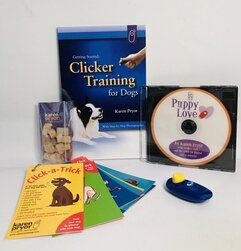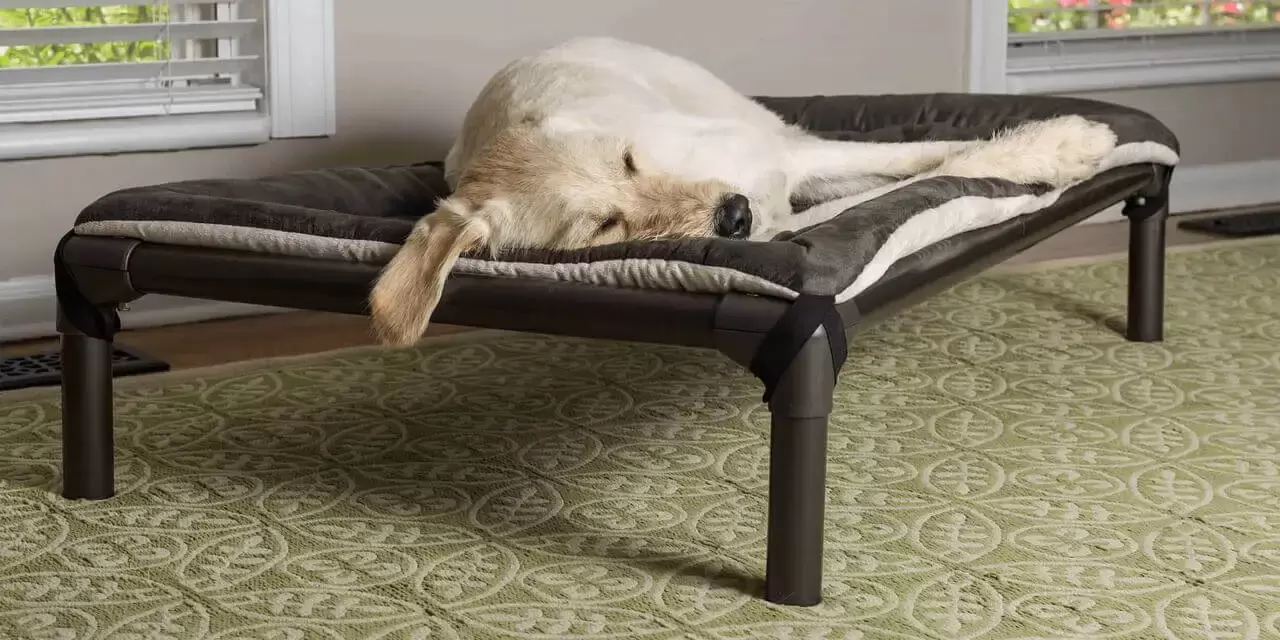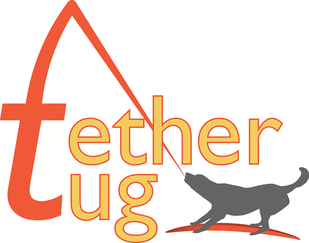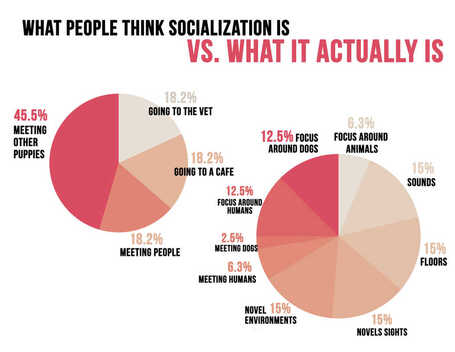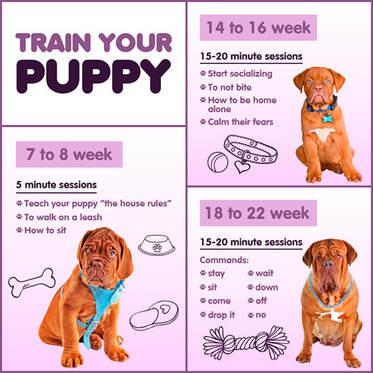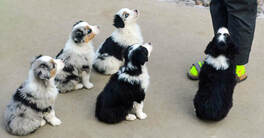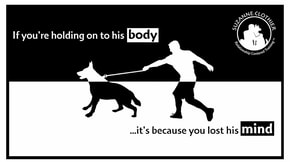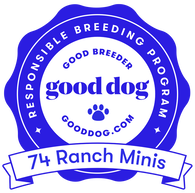After you bring Your Mini Puppy Home
We highly recommend Puppy Culture DVD's. They have ones for the powerful first 12 months, ones on focus, stacking, scent work and brochures on spay/neuter, exercise charts, etc. This program shapes your puppy's future! Click on the image above to see more!
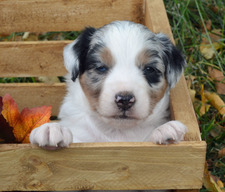
RECALLS: Recalls are highly important, it can save your puppies life!
A recall for a puppy is quite simple - BUT a recall with distractions could prove to be more difficult. Use classical conditioning to get your puppy to have a solid recall. This is where the puppy learns to make an association between two stimuli. Ivan Pavlov illustrated classical conditioning through his experiments - when food was presented to dog it naturally salivated. After repeating the sound of a bell with food the dog salivated just by hearing the bell even when food was absent. The bell meant nothing to the dog in the beginning.
Typical recalls people use are 'come' or 'here' a whistle or blinking light (in the case of a blind dog). What you do after the recall word/sound will dictate what your dog's response will be. Say the word/sound then treat when the dog comes. No other behavior is necessary, just coming. The puppy learns to expect something good when it comes. Don't just call the puppy when it 'expects' you to - call when it's looking away, playing with a toy, etc. Also do not call the puppy to come to do something it won't like - such as brushing, checking teeth, putting in the crate, give it a vaccination, coming in the house if it wants to be outside, etc. GO pick up your puppy if you are wanting to do any of those things.
Puppies/dogs are smart, they know when you are being predictable - if you go for a walk off leash and call the dog to come then put it in the crate to go home (and it doesn't want to, of course) it may come the first few times but after a few times it's going to know that 'game' and not come. In order to prevent these things from happening you need to be UNPREDICTABLE! Yes, unpredictable! So before you go to work, let your puppy play in the yard, call him to come, give treat then let him go back out to play. One day do this 1ce, another 2ce, another 3 or 4 times (take the time to do it, it will be worth it). Keep that puppy guessing! On your walk - have the puppy come like you are going to leave, treat it, DON'T leave, let it go play again. When you decide to leash him to go home, walk a ways away from the area you leashed him last time, call, treat, leash and walk home!
A recall for a puppy is quite simple - BUT a recall with distractions could prove to be more difficult. Use classical conditioning to get your puppy to have a solid recall. This is where the puppy learns to make an association between two stimuli. Ivan Pavlov illustrated classical conditioning through his experiments - when food was presented to dog it naturally salivated. After repeating the sound of a bell with food the dog salivated just by hearing the bell even when food was absent. The bell meant nothing to the dog in the beginning.
Typical recalls people use are 'come' or 'here' a whistle or blinking light (in the case of a blind dog). What you do after the recall word/sound will dictate what your dog's response will be. Say the word/sound then treat when the dog comes. No other behavior is necessary, just coming. The puppy learns to expect something good when it comes. Don't just call the puppy when it 'expects' you to - call when it's looking away, playing with a toy, etc. Also do not call the puppy to come to do something it won't like - such as brushing, checking teeth, putting in the crate, give it a vaccination, coming in the house if it wants to be outside, etc. GO pick up your puppy if you are wanting to do any of those things.
Puppies/dogs are smart, they know when you are being predictable - if you go for a walk off leash and call the dog to come then put it in the crate to go home (and it doesn't want to, of course) it may come the first few times but after a few times it's going to know that 'game' and not come. In order to prevent these things from happening you need to be UNPREDICTABLE! Yes, unpredictable! So before you go to work, let your puppy play in the yard, call him to come, give treat then let him go back out to play. One day do this 1ce, another 2ce, another 3 or 4 times (take the time to do it, it will be worth it). Keep that puppy guessing! On your walk - have the puppy come like you are going to leave, treat it, DON'T leave, let it go play again. When you decide to leash him to go home, walk a ways away from the area you leashed him last time, call, treat, leash and walk home!
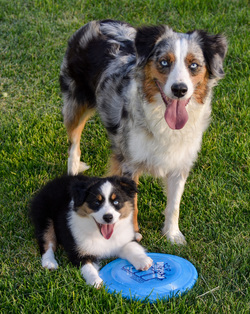
POTTY TRAINING:
WE have started crate training and potty training the puppies. In order to continue on and prevent relapses, you must be CONSISTENT. Do not SCOLD your puppy for peeing/pooping in the house. This will just build a fear in them or stress them and they will hide from you to do it next time. Do not take the puppy out every hour or they will not build the muscles to hold it a bit longer but try to get them out before they need to go (like after they play hard or just wake up). Clean the accident thoroughly so they can't smell it and go there again. Do not give the puppy too much freedom in house. If you can't watch the puppy, put it in a crate, outside or in a pen. You can also attach a leash to them and you so the puppy doesn't wander off. Too much freedom too soon could set them back weeks or months. Do not confine your puppy so far away from family that noone hears it ask to go outside. Be sure to watch for signs, they will be there, you need to watch! USE A CRATE or PEN. Confining to it's own living space is the only way to truly succeed at potty training! Do all this consistently for 1 month and straight and your puppy should be pretty reliable to hold it!
WE have started crate training and potty training the puppies. In order to continue on and prevent relapses, you must be CONSISTENT. Do not SCOLD your puppy for peeing/pooping in the house. This will just build a fear in them or stress them and they will hide from you to do it next time. Do not take the puppy out every hour or they will not build the muscles to hold it a bit longer but try to get them out before they need to go (like after they play hard or just wake up). Clean the accident thoroughly so they can't smell it and go there again. Do not give the puppy too much freedom in house. If you can't watch the puppy, put it in a crate, outside or in a pen. You can also attach a leash to them and you so the puppy doesn't wander off. Too much freedom too soon could set them back weeks or months. Do not confine your puppy so far away from family that noone hears it ask to go outside. Be sure to watch for signs, they will be there, you need to watch! USE A CRATE or PEN. Confining to it's own living space is the only way to truly succeed at potty training! Do all this consistently for 1 month and straight and your puppy should be pretty reliable to hold it!
Things to purchase AFTER taking puppy home (if you didn't do so before):
DVD's we recommend: Puppy Culture, Books/DVD's by Ian Dunbar, Suzanne Clothier, Patricia McConnell and Karen Pryor Clicker Training (click the image below to see more)
How of Bow Wow and Bow Wow Take 2 and ones for teaching tricks
toys (and chewtoys) and bones We fill a Kong and freeze it and that's their lunch meal
Treats for training-different treats - homemade liver is great, also soft treats that aren't real high in calories. Using different treats for different training days keeps them engaged!
Continue on with your Canine Complete Immune
Kurunda Beds
Tethertug Dog Toy!
DVD's we recommend: Puppy Culture, Books/DVD's by Ian Dunbar, Suzanne Clothier, Patricia McConnell and Karen Pryor Clicker Training (click the image below to see more)
How of Bow Wow and Bow Wow Take 2 and ones for teaching tricks
toys (and chewtoys) and bones We fill a Kong and freeze it and that's their lunch meal
Treats for training-different treats - homemade liver is great, also soft treats that aren't real high in calories. Using different treats for different training days keeps them engaged!
Continue on with your Canine Complete Immune
Kurunda Beds
Tethertug Dog Toy!
Your dogs will LOVE Clicker Training with you Sleeping on Kurunda Beds and they will LOVE Tether Tug - You can save 10% off Tether Tug: Use code COMEBACK10
Online Training:
www.ultimatepuppy.com Be sure to click on the box on the right side "Sign Up for Puppy Bytes" to receive weekly emails.
Go to Youtube and search for Zak George videos - short, positive training and fun!
www.avidog.com Search around for training tips
www.ultimatepuppy.com Be sure to click on the box on the right side "Sign Up for Puppy Bytes" to receive weekly emails.
Go to Youtube and search for Zak George videos - short, positive training and fun!
www.avidog.com Search around for training tips
WHY SHOULD YOU TRAIN YOUR PUPPY? BECAUSE soon it will be an adolescent/ a teenager...! This article will help you know what to expect!
What Happens When Dogs Hit Adolescence? - Dog Discoveries
What Happens When Dogs Hit Adolescence? - Dog Discoveries
Crate Training Info:
We highly recommend crate training for going to bed and potty training. We have them well started before they leave here. Many pups will sleep 6 hrs before they leave here and they all eat their meals in a crate. You may need to place the crate in your room close to you for a few days. As they get used to that, move the crate further from you each night. Be consistent - it will pay off!
Until the puppies know where we want them to go potty we go out with them. Use a word like 'go' or 'potty'. When they go have a celebration - clap your hands and say "good potty". If you see the puppy circle or whine, get him out before he has an accident. IF the puppy has an accident, do NOT punish him, he will just start hiding to have his 'accident' (it's really not an accident - they have to go when they have to go, it's up to us to watch for the signs and/or take them out plenty of times to give them a chance to go). Plan to get up with the puppy until about 12-14 weeks old. If you wake up, take the pup out potty then put it back in the crate. If the pup wakes up he may need to go potty or you may just keep quiet for a few minutes and see if it goes back to sleep. Be sure to withhold food 2 hrs before bedtime. If you can get the puppy out BEFORE he cries it's best as he won't think the crying is what made you let him out (like praise). If he needs to go out in the night be sure to go with him outside, go potty, then put right back in the crate. Do not play or get too exciting at this time. Never put your pup in a dirty crate.
We give the pup a treat when they go in the crate so they begin to enjoy it and know there's a reward for going in. Puppies sleep a lot! Be sure the puppy gets plenty of quiet rest during the day. You will notice eventually the puppy may go in to the crate with the door open on his own.
Submissive peeing can also happen: When a puppy is extremely happy, excited or frightened, he may pee. This is INVOLUNTARY, do not punish the puppy. That will make it worse. Ignore it, usually they outgrow these emotional reactions.
Make sure everyone in the household is 'on the same page' when it comes to potty and crate training. Consistency is highly important for the puppy
We highly recommend crate training for going to bed and potty training. We have them well started before they leave here. Many pups will sleep 6 hrs before they leave here and they all eat their meals in a crate. You may need to place the crate in your room close to you for a few days. As they get used to that, move the crate further from you each night. Be consistent - it will pay off!
Until the puppies know where we want them to go potty we go out with them. Use a word like 'go' or 'potty'. When they go have a celebration - clap your hands and say "good potty". If you see the puppy circle or whine, get him out before he has an accident. IF the puppy has an accident, do NOT punish him, he will just start hiding to have his 'accident' (it's really not an accident - they have to go when they have to go, it's up to us to watch for the signs and/or take them out plenty of times to give them a chance to go). Plan to get up with the puppy until about 12-14 weeks old. If you wake up, take the pup out potty then put it back in the crate. If the pup wakes up he may need to go potty or you may just keep quiet for a few minutes and see if it goes back to sleep. Be sure to withhold food 2 hrs before bedtime. If you can get the puppy out BEFORE he cries it's best as he won't think the crying is what made you let him out (like praise). If he needs to go out in the night be sure to go with him outside, go potty, then put right back in the crate. Do not play or get too exciting at this time. Never put your pup in a dirty crate.
We give the pup a treat when they go in the crate so they begin to enjoy it and know there's a reward for going in. Puppies sleep a lot! Be sure the puppy gets plenty of quiet rest during the day. You will notice eventually the puppy may go in to the crate with the door open on his own.
Submissive peeing can also happen: When a puppy is extremely happy, excited or frightened, he may pee. This is INVOLUNTARY, do not punish the puppy. That will make it worse. Ignore it, usually they outgrow these emotional reactions.
Make sure everyone in the household is 'on the same page' when it comes to potty and crate training. Consistency is highly important for the puppy
Socialization:
Early and continuous socialization is extremely important. Some Aussies are reserved by nature so it must be introduced to many new people (all ages), situations, environments and activities We give you a 2 page checklist to be sure you expose them to all kinds of things. The first few months is the most important. Most times it only takes 1 exposure at a young age but if you wait until they are older it may take a lot of exposures to get them over the new experience/person. An obedience class is highly recommended from a positive reinforcement trainer (clicker training preferred). Take the puppy with you as often as possible. Take the puppy to your vet (if not fully vaccinated, you may not want to let him down but hold instead) just for a visit - no pokes or prods...
Ian Dunbar has helped the world decide it's smarter to get your puppy out for socialization than waiting for all immunizations to take effect. They need to see as many people, pets and places as possible in the first 4 months, starting at 8 weeks old. They will learn their environments and other animals are safe. If you wait the puppy may become fearful of new things. He may defend himself through growling, barking or even biting if he's afraid. Take proper precautions for their safety, however. Walk your puppy in neighborhoods where most dogs are vaccinated and stay away from parks, especially dog parks where other dogs are known to frequently visit.
Early and continuous socialization is extremely important. Some Aussies are reserved by nature so it must be introduced to many new people (all ages), situations, environments and activities We give you a 2 page checklist to be sure you expose them to all kinds of things. The first few months is the most important. Most times it only takes 1 exposure at a young age but if you wait until they are older it may take a lot of exposures to get them over the new experience/person. An obedience class is highly recommended from a positive reinforcement trainer (clicker training preferred). Take the puppy with you as often as possible. Take the puppy to your vet (if not fully vaccinated, you may not want to let him down but hold instead) just for a visit - no pokes or prods...
Ian Dunbar has helped the world decide it's smarter to get your puppy out for socialization than waiting for all immunizations to take effect. They need to see as many people, pets and places as possible in the first 4 months, starting at 8 weeks old. They will learn their environments and other animals are safe. If you wait the puppy may become fearful of new things. He may defend himself through growling, barking or even biting if he's afraid. Take proper precautions for their safety, however. Walk your puppy in neighborhoods where most dogs are vaccinated and stay away from parks, especially dog parks where other dogs are known to frequently visit.
Basic Training:
When they start to chew on something he shouldn't, say 'No', take him away from it and what he's doing and give him something to chew on. Rawhides and cowears are fine but not too many as he could become constipated, plush toys or ties on a rope are fine if supervised. Rotate toys so he doesn't become bored. If you want him to play frisbee later, feed him in one now, he will get used to the smell, taste and texture. Start with rolling it on the ground, then tossing low right to him, then you can graduate in to tossing further away and in a location they have to look for it to go. You want him to succeed at whatever he does, don't set him up for failure.
Don't break your puppy's spirit: Control the environment and reward positive actions and confidence. Do not reward unwanted behaviors. Have them work for their treats and love - a sit or down instead of jumping up and such.
Do not wait for them to 'settle in' before training. The puppy will form new habits right aware, whether you are aware of it or not. The humans in the household are also developing habits. Be sure to develop good habits for both humans and puppy right away. Set clear rules and guidelines, communicate them by rewarding those desired behaviors exactly when/as they occur. Puppies will be more aware of your body language than human words.
When they start to chew on something he shouldn't, say 'No', take him away from it and what he's doing and give him something to chew on. Rawhides and cowears are fine but not too many as he could become constipated, plush toys or ties on a rope are fine if supervised. Rotate toys so he doesn't become bored. If you want him to play frisbee later, feed him in one now, he will get used to the smell, taste and texture. Start with rolling it on the ground, then tossing low right to him, then you can graduate in to tossing further away and in a location they have to look for it to go. You want him to succeed at whatever he does, don't set him up for failure.
Don't break your puppy's spirit: Control the environment and reward positive actions and confidence. Do not reward unwanted behaviors. Have them work for their treats and love - a sit or down instead of jumping up and such.
Do not wait for them to 'settle in' before training. The puppy will form new habits right aware, whether you are aware of it or not. The humans in the household are also developing habits. Be sure to develop good habits for both humans and puppy right away. Set clear rules and guidelines, communicate them by rewarding those desired behaviors exactly when/as they occur. Puppies will be more aware of your body language than human words.
Teething, nipping and biting/chewing:
If he starts biting or placing his teeth on your skin say 'aacht' in a high pitched sound and walk away. If he bites you don't play is what you are trying to tell him. If he continues, use 1 or 2 fingers and tap the top of his muzzle and say 'no bite'. Then go on about your business, forgiving him. Give him something in place of it that he can chew on. Don't play tug at this age or if you do, do it lightly. You can get a few braided and knot toys, wet them down, put on wax paper, freeze. Cold helps relieve teething pain. Supervise when you give it to them. Switch to another frozen one when that one is defrosted. Do not let them ingest the fringes.
If he wants to bite heels (they are herding dogs) carry a flyswatter and wave it (do not hit him) back and forth behind you at floor level. Don't say anything. If he gets close he could get it in the face so swat lightly. He will learn to give more space. Don't move it as if playing.
Be sure to go to YOUTUBE and search for Zak George videos on all these subjects. He has some awesome ones!!!
Video: Stop Puppy Biting
If he starts biting or placing his teeth on your skin say 'aacht' in a high pitched sound and walk away. If he bites you don't play is what you are trying to tell him. If he continues, use 1 or 2 fingers and tap the top of his muzzle and say 'no bite'. Then go on about your business, forgiving him. Give him something in place of it that he can chew on. Don't play tug at this age or if you do, do it lightly. You can get a few braided and knot toys, wet them down, put on wax paper, freeze. Cold helps relieve teething pain. Supervise when you give it to them. Switch to another frozen one when that one is defrosted. Do not let them ingest the fringes.
If he wants to bite heels (they are herding dogs) carry a flyswatter and wave it (do not hit him) back and forth behind you at floor level. Don't say anything. If he gets close he could get it in the face so swat lightly. He will learn to give more space. Don't move it as if playing.
Be sure to go to YOUTUBE and search for Zak George videos on all these subjects. He has some awesome ones!!!
Video: Stop Puppy Biting
VACCINATIONS: We believe less is more when it comes to vaccinations. Please read this vaccination protocol and do your research before making decisions on vaccinations for your puppy/dog. We personally, have decided not to do 5 way vaccinations on our dogs that live with us. We are giving a Parvo shot at 8 weeks then a Distemper shot 3 days later but we will let you choose which vaccinations you want at 8 weeks (even NO vaccination). We use Anti-Vaccinosis afterwards for 2 days. We repeat the process at 16 weeks. We no longer do yearly vaccinations as they are not necessary but it's up to you to do your research.
| vaccination_protocol.pdf | |
| File Size: | 398 kb |
| File Type: | |

We get our grooming supplies and more from Cherrybrook - Link below!
WHEN should you SPAY or NEUTER???
There are conflicting ideas about this, we do not give advice but say to DO YOUR RESEARCH:
Please do research and read these links:
Puppy culture also has a brochure on this subject.
Healthy Pets - Mercola
Huffington Post
There are conflicting ideas about this, we do not give advice but say to DO YOUR RESEARCH:
Please do research and read these links:
Puppy culture also has a brochure on this subject.
Healthy Pets - Mercola
Huffington Post
|
Favorite Products and websites:
Kong (fill with yogurt, natural peanut butter, kibble, etc. freeze) Chewy.com (Autoship is great!) Cow Ears, Bully Sticks, Pig Ears Dr Karen Becker Vital Animal - The Natural Path Anti Vaccinosis - Homeopathic treatment following vaccinations CherryBrook - grooming supplies and more Darwins Raw Food art |
Recommended Reading and Videos:
Puppy Clicker Kit - Karen Pryer "Puppy Start Right" Kenneth M Martin "The Perfect Puppy in 7 days" Dr Sophia Yin Books by Grisha Stewart Youtube videos on training by Zak George Articles under the Learn button -Suzanne Clothiery Dr. Sophia Yin |
ASDR, American Stock Dog Registry, MASCA, Miniature Australian Shepherd Club, MASCUSA, IMASC, IHDA, International Herding Dog Association, ASA, Australian Shepherd Association

